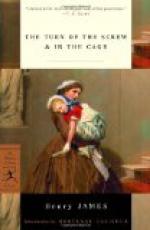Well, she saw him the very next day, and on this second occasion it was quite different; the sense of every syllable he paid for was fiercely distinct; she indeed felt her progressive pencil, dabbing as if with a quick caress the marks of his own, put life into every stroke. He was there a long time—had not brought his forms filled out but worked them off in a nook on the counter; and there were other people as well—a changing pushing cluster, with every one to mind at once and endless right change to make and information to produce. But she kept hold of him throughout; she continued, for herself, in a relation with him as close as that in which, behind the hated ground glass, Mr. Buckton luckily continued with the sounder. This morning everything changed, but rather to dreariness; she had to swallow the rebuff to her theory about fatal desires, which she did without confusion and indeed with absolute levity; yet if it was now flagrant that he did live close at hand—at Park Chambers—and belonged supremely to the class that wired everything, even their expensive feelings (so that, as he never wrote, his correspondence cost him weekly pounds and pounds, and he might be in and out five times a day) there was, all the same, involved in the prospect, and by reason of its positive excess of light, a perverse melancholy, a gratuitous misery. This was at once to give it a place in an order of feelings on which I shall presently touch.
Meanwhile, for a month, he was very constant. Cissy, Mary, never re-appeared with him; he was always either alone or accompanied only by some gentleman who was lost in the blaze of his glory. There was another sense, however—and indeed there was more than one—in which she mostly found herself counting in the splendid creature with whom she had originally connected him. He addressed this correspondent neither as Mary nor as Cissy; but the girl was sure of whom it was, in Eaten Square, that he was perpetually wiring to—and all so irreproachably!—as Lady Bradeen. Lady Bradeen was Cissy, Lady Bradeen was Mary, Lady Bradeen was the friend of Fritz and of Gussy, the customer of Marguerite, and the close ally in short (as was ideally right, only the girl had not yet found a descriptive term that was) of the most magnificent of men. Nothing could equal the frequency and variety of his communications to her ladyship but their extraordinary, their abysmal propriety. It was just the talk—so profuse sometimes that she wondered what was left for their real meetings—of the very happiest people. Their real meetings must have been constant, for half of it was appointments and allusions, all swimming in a sea of other allusions still, tangled in a complexity of questions that gave a wondrous image of their life. If Lady Bradeen was Juno it was all certainly Olympian. If the girl, missing the answers, her ladyship’s own outpourings, vainly reflected that Cocker’s should have been one of the bigger offices where telegrams arrived as well as departed, there were yet ways in which, on the whole, she pressed the romance closer by reason of the very quantity of imagination it demanded and consumed. The days and hours of this new friend, as she came to account him, were at all events unrolled, and however much more she might have known she would still have wished to go beyond. In fact she did go beyond; she went quite far enough.




